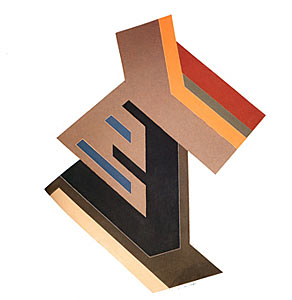
Born in 1936 in Malden, Washington (US)
Lives and works in New York City, New York (US)

1971
Felt, canvas, cardboard, stretcher
284 x 256 x 15 cm
Actuellement en dépôt : Musée des beaux-arts, Nancy
Year of Purchase: 1984
Frank Stella stands apart and on his own because of his self-reflexive praxis which sees art as a set of problems to be solved. The artist broaches this inner critique by means of successive series. After putting across a new form of black and rigorous abstraction in the 1960s, he experimented with the relations between colours and geometric forms. The culmination of these works was no longer contemplation, but the instant grasp, the impact of the gaze, and its way of looking at things. Stella proceeds from abstract asceticism to the decorative motif. However, the apparent formalism of his canvases does not rule out a far-reaching moral commitment and a line of thinking about art praxis. So the Polish series undertaken in 1970 refers to the 18th century synagogues destroyed by the Nazis. In these religious buildings Stella rediscovers the dovetailing typical of his own works. He also feels the tenacity with which these buildings have been tirelessly rebuilt down the centuries, and links this with his state of mind of the moment. The Polish series is less systematic and symmetrical. The artist abandons the canvas and flatness, and adopts wood and relief. His ‘constructed paintings’, such as Konskie I, Polish Village (1971) seem to be balanced on a corner. This series is aesthetically and morally akin to Russian constructivism, with which it shares the ideals behind the struggle of the oppressed and the victory of freedom.
Sophie Richard